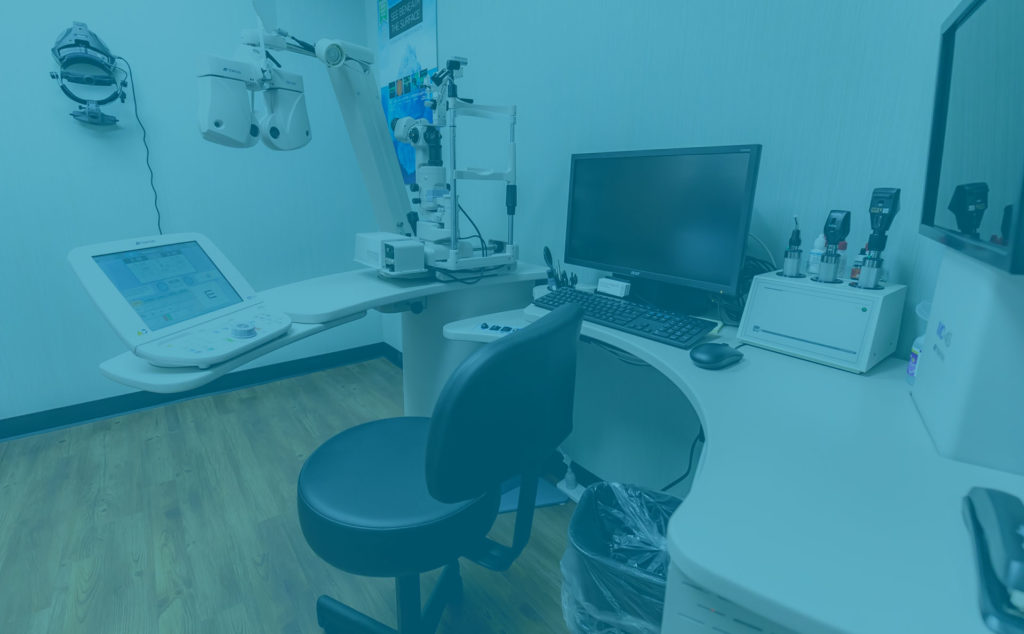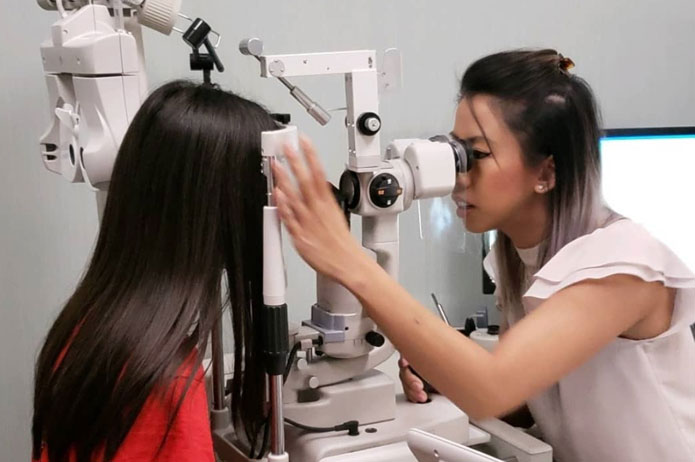Myopia Management
Booth Eye
Myopia Management
Having myopia means that you have trouble seeing far away. Another term for this is nearsightedness, an easy way to remember this is that you can see near, but not far. Typically if you have parents who are myopic, then chances are that you are likely to develop myopia as well. There have been recent new efforts in trying to control patients’ myopia. Parents who are concerned about their children developing myopia should have them come in for an eye exam at an early age (Dr. Hoang sees patients age 5+). The earlier we determine that your child may be at risk for myopia, the earlier we can initiate treatment to slow down the progression of it.
Myopia is basically caused by the eye being too elongated. This can cause eye health problems down the road like glaucoma and retinal detachment. By initiating treatment in young children, we can help prevent or reduce the severity of myopia and ocular health issues when they are older.
Here are the different types of myopia management treatments that Dr. Hoang does in her office:
Orthokeratology– This is a small, rigid, contact lens that is placed on the eye before you go to bed. You sleep in them overnight! The idea is that it acts like a mold or a retainer for the eye. It reshapes your eye while you are sleeping, it flattens your cornea centrally so that you have effectively changed your prescription to close to nothing. When you wake up in the morning after having used the lenses, you take them out and clean them and store them in contact lens solution (Clear Care or Boston Simplus/Advanced).
Atropine: We are also equipped with the Zeiss Humphrey FDT (frequency doubling technology). This test evaluates your peripheral vision to screen for glaucoma, and show any signs of peripheral or central vision loss. It will map out any vision loss within 30 degrees of your peripheral sight. This test is especially important if you have high intraocular pressure, headaches, flashes or floaters, medications that may affect the eyes, or personal/family history of glaucoma.
Multifocal Soft Contacts – We use the OptoVue iFusion device to take a photo and also a digital scan of the retinal layers inside your eyes (think of seeing the layers of a birthday cake without having to cut the cake). This will allow you and the doctor to see retinal diseases likes macular degeneration, glaucoma, and diabetic retinopathy. With a comprehensive eye exam, the doctor requires that every patient does this as a baseline, even if your eyes are presumed healthy. A retinal exam is then recommended at least once every following year, and mandatory every year for patients who have diabetes.
We monitor axial length: We will use a slit lamp to examine the front of your eyes and also check for diseases like cataracts inside your eye. When your pupils are too small to look into eye, we may suggest dilation for better evaluation.
Dilation – This is recommended for patients who have a history of diabetes, high blood pressure, autoimmune disease, cancer or are highly nearsighted. Dilation will typically be scheduled as a separate follow-up visit for patients who need an annual diabetic eye exam (a report will be written for your primary care doctor/endocrinologist).
Eyeglass Prescription Check: After checking your child’s prescription, we get a lot of parents who ask to undercorrect their child’s vision, thinking that this is going to keep their child’s prescription from increasing. THIS IS FALSE! Please do not ask your doctor to intentionally cut back a child’s rx. Myopia progression occurs because of something called peripheral hyperopic defocus. For more information on this, read this: https://www.eyedolatryblog.com/2015/06/whats-happening-to-our-vision.html.
A lot of patients now work on the computer and laptop. We realize that the technique of getting you computer glasses is not a “one size fits all” type of fitting. It is important that we know how many monitors you work with, how far your monitors are from your eyes (working distance) and also if you require the use of paper/pen at the desk. Once we gather that information, we can recommend the best type of rx for you.
Call (714) 838-3210 for an appointment!
our patients
what people say
“Dr. Hoang and her team made my routine eye exam very insightful and informative. I couldn’t be happier with my new contacts & glasses!”
“Dr Hoang was great. Gave me a lot of info and really was patient and took the time to make sure I understood everything. A great experience. I really felt like everyone on staff cared. Thank you”
“Very pleased with Dr. Hoang and the staff, are friendly and efficient. Make an appointment, you won’t be disappointed!”


